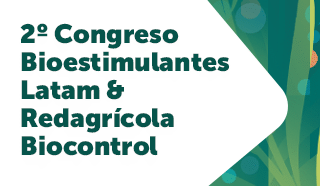10/Mar/2022
#03
SUBSCRIBE TO OUR NEWSLETTER
Suscríbete a nuestro newsletter
Last issue articles
- Biome: the space gaining protagonism in biological strategies for crops
- The export dynamics driving the Mexican biologicals market
- New model developed to evaluate effects of two or more biostimulants combined in a single crop
- Dr. Wagner Bettiol and the biocontrol market in Brazil
- Las propiedades que hacen del Trichoderma un socio clave en la búsqueda de mejores desempeños en los cultivos
- Changes in the new regulation on fertilizers and biostimulants in Chile
- Innovak Global, the expansion of root specialists
Market movers
- Renewable-based nitrogen fertilizer firm raises US$ 20 million in investment round
- Bayer and Ginkgo Bioworks close agreement to strengthen open innovation platform for agricultural biologics
- Argentinean firm Puna Bio: Millions raised to study superbacteria for agricultural use
- Corteva Agriscience signed an agreement to acquire leading biologics company Symborg
- Brazilian study uncovers ants' potential in crop protection
- Huber acquires specialty plant nutrition producer Biolchim
- UPL announces agreement to distribute bioprotector based on orange oil
- ICL and Lavie Bio start strategic collaboration to develop new biostimulants
- Hortitool and Green Smile to organize the Morocco Berry Conference 2022

8 keys on the new process for the approval of biopesticides in Europe
The European Union seeks to facilitate the processes that allow the application of biopesticides in agricultural land, where food is produced for its 450 million inhabitants. Therefore, as part of their “Farm to Fork” program, the member states approved new regulations to facilitate the approval of microorganisms and their use as active substances in phytosanitary products. Thus, European farmers will have new options to replace their chemical pesticides and shift towards new solutions consistent "with sustainable food systems", according to the continental authority.
At the end of February, the bloc's Health and Food Safety Commissioner, Stella Kyriakides, said: “Today, we bring good news to European farmers to help them stop using chemical pesticides. Biological products can protect your crops with less risk to human health or the environment. Food systems are key drivers of climate change and environmental degradation, and we must urgently make this transition.”
Kyriakides added that, under the Farm to Fork Strategy, the EU committed to reduce by 50% the use of chemical pesticides by 2030 and to do so, it is crucial to provide alternatives that respect the planet and health. “The EU has among the highest environmental requirements and a leading role when it comes to sustainability of its food system – today's announcement is further tangible and concrete proof of this.”
Once the new regulations are applied - scheduled for November - the approval of microorganisms and the authorization of biological plant protection products that contain them will be significantly faster, accelerating their commercialization process.
The new regulations will specifically put the biological and ecological properties of each micro-organism at the center of scientific risk assessment, which must demonstrate safety before micro-organisms can be approved as active substances in plant protection products. More information is available in these questions and answers.
Here are the answers prepared by the European Commission to eight key questions about the new regulations.
- What has been endorsed by the Member States and what are the next steps?
Member States endorsed four legal acts which will simplify the process of approval and authorisation of biological plant protection products which contain micro-organisms. The objective is to provide farmers with tools to substitute chemical plant protection products.
These acts reflect the latest scientific developments and are based on the specific biological properties of micro-organisms.
Farmers are keen to have access to sustainable solutions to protect crops. By facilitating the placing on the market of these biological plant protection products, farmers – including those producing organic crops - will have more alternatives available for sustainable crop protection.
The acts will now be scrutinised by the European Parliament and the Council. If they do not object, they will be adopted and be applicable in Q4 2022.
- What are micro-organisms and how can they be used as active substances in plant protection products?
Micro-organisms are bacteria, fungi, viruses, and protozoa.
Some of them are parasites or pathogens of insects or other organisms that are pests or cause disease in plants. Because of their biological properties, these micro-organisms have been used world-wide (including in the EU) for decades in biological control of pests and plant diseases.
Micro-organisms are naturally occurring in the environment. The strains with the best properties are those used in biological control to fight pests and diseases in crop protection.
However, before micro-organism are allowed to be used, it needs to be verified that their use is safe and has no negative consequences for human and animal health or towards other non-target organisms.
- How do these new Regulations foster the access to market of micro-organisms used in plant protection products?
So far the requirements for micro-organisms were based on principles which were very similar to those for chemical active substances.
La nueva ley sigue un enfoque diferente que se basa en la biología y ecología de cada microorganismo y tiene en cuenta los conocimientos científicos más recientes. De esta forma, los requisitos reglamentarios para los microorganismos se vuelven más “adecuados para el propósito” y flexibles. Además, al centrarse solo en los datos relevantes, también significa menos experimentos con animales.
The biological properties of the micro-organisms play a central role for the risk assessment and many data required in the new implementing acts are conditional to the biology and ecology of the particular micro-organism. In any case, a micro-organism can only be approved for use if it is proven that it does not cause disease in humans or animals.
Los requisitos más “adecuados para el propósito” y flexibles también implican expedientes de solicitud simplificados, una evaluación de riesgos más directa y plazos más cortos para acceder al mercado de la UE.
These new Regulations are based on the most updated science. They make the EU one of the most advanced regulators on the global stage for these products.
- How will the use of micro-organisms contribute to the objectives of the Farm to Fork and the Green Deal, in particular for farmers?
The Farm to Fork Strategy and the Green Deal aim at reducing dependency on and use of chemical plant protection products.
Micro-organisms used as biocontrol agents in plant protection products provide farmers with alternative tools to substitute chemical plant protection products. They can also be used in organic agriculture.
The new requirements are expected to lead to a faster access to the EU market for micro-organism and plant protection products containing them.
- 5. Is it safe to use micro-organisms in agriculture?
Micro-organisms have been used by humans almost as long as humanity exists, for instance for bread, cheese, beer and wine-making purposes.
In modern times their uses have been widened. They can be used, for instance, as fundamental components of probiotics of food/feed additives, or for manufacturing medicinal active substances.
Los microorganismos son naturales y la mayoría de ellos son inofensivos. Muchos de ellos desempeñan funciones clave en los ecosistemas, por ejemplo, al descomponer la materia orgánica del suelo para que esté disponible para otros organismos, o al enriquecer el suelo con nitrógeno atmosférico (“fijación de nitrógeno”) para que esté disponible para las plantas.
Micro-organisms, like all the other active substances used in plant protection products (PPPs), can only be approved for use if they fulfil the approval criteria laid down in the Regulation on placing on the market of PPPs.
The Member States, the European Food Safety Authority (EFSA) and the Commission evaluate every active substance for safety for humans and the environment before it can be placed on the market and used in a plant protection product. In a 2nd regulatory step, Member States authorise each plant protection product containing approved active substances for the intended use.
Currently more than 60 micro-organisms are approved in EU after a scientific risk assessment confirmed that their use in plant protection products is safe.
- Viruses can also be approved. Is this safe?
Several viruses that are highly specific for insects or plants are currently approved in the EU for plant protection purposes and have been proven to be safe since many years. Because they are highly specific towards a narrow group of plant pests, they cannot infect humans or other organisms which are not plant pests.
It is important to underline that viruses, like other micro-organisms, will not be approved if they cause disease in humans. The Member States and the European Food Safety Authority (EFSA)evaluate their safety for human health and the environment before approval.
- Are plant protection products (PPPs) containing micro-organisms as efficacious as chemicals?
Biological plant protection products containing micro-organisms may be less efficient than chemicals, for instance because of their narrow host range and because as living organisms they require optimal conditions to successfully control the pests. This makes them also inherently safer than chemicals.
However, the use of such biological alternatives plays a key role in organic farming where farmers can use micro-organism as biological control agents. Micro-organisms are also crucial for Integrated Pest Management (IPM), which farmers have to use in the EU. Farmers must give preference to preventive actions, monitoring and biological plant protection alternatives (including micro-organisms based products), before using chemical plant protection products.
IPM also aims to keep the use of pesticides and other forms of intervention only to levels that are economically and ecologically justified, and other measures like crop rotation, selection of appropriate cultivars and cultivation techniques could also be used.
- Will this have an impact on organic farming?
Organic farming is a key sector for EU agriculture. In 2019 there were almost 330.000 organic farmers in EU, reaching up to 20% share of farming area in Member States. In addition, one of the targets of the Farm to Fork Strategy concerns the increase the total farmland under organic farming in EU, with at least 25% of the EU's agricultural land to be under organic farming by 2030.
Biological plant protection products can be used in organic agriculture. The new Regulations will fasten the access to market for micro-organisms used in biological plant protection products and thus make new sustainable alternatives available to EU organic farmers for controlling plant pests.
Last issue articles
- Biome: the space gaining protagonism in biological strategies for crops
- The export dynamics driving the Mexican biologicals market
- New model developed to evaluate effects of two or more biostimulants combined in a single crop
- Dr. Wagner Bettiol and the biocontrol market in Brazil
- Las propiedades que hacen del Trichoderma un socio clave en la búsqueda de mejores desempeños en los cultivos
- Changes in the new regulation on fertilizers and biostimulants in Chile
- nnovak Global, la expansión de los especialistas en la raíz
Market movers
- Argentinean firm Puna Bio: Millions raised to study superbacteria for agricultural use
- Corteva Agriscience signed an agreement to acquire leading biologics company Symborg
- Brazilian study uncovers ants' potential in crop protection
- Huber acquires specialty plant nutrition producer Biolchim
- UPL announces agreement to distribute bioprotector based on orange oil
- ICL and Lavie Bio start strategic collaboration to develop new biostimulants
- Hortitool and Green Smile to organize the Morocco Berry Conference 2022
About us
Biologicals Latam es una revista digital de Redagrícola que informa de manera especializada sobre la intensa actividad que se está desarrollando en el espacio de los bioinsumos para la producción agrícola. Esta publicación es complemento del Curso Online de Bioestimulantes y Biocontrol y las conferencias que este grupo de medios realiza en torno al tema.



